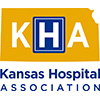 (July 2023) – The Kansas Hospital Association continues to evaluate the current workforce landscape, what we have accomplished thus far and the priorities going forward. Earlier this year, a rural health care apprenticeship grant was awarded to Labette Health and Pratt Regional Medical Center. Next, the Kansas State Board of Nursing approved a statement of support for LPN apprenticeships. Finally, the Kansas Legislature passed the Kansas Apprenticeship Act providing $7.5 million in tax credits for for-profit employers and $2.5 million in grants for not-for-profit employers wanting to pursue an apprenticeship program. An intermediary company has been engaged to help hospitals with support in developing and administering registered apprenticeship programs. Several Kansas hospitals have launched apprenticeship programs, and others are in the process of launching programs in the coming months.
(July 2023) – The Kansas Hospital Association continues to evaluate the current workforce landscape, what we have accomplished thus far and the priorities going forward. Earlier this year, a rural health care apprenticeship grant was awarded to Labette Health and Pratt Regional Medical Center. Next, the Kansas State Board of Nursing approved a statement of support for LPN apprenticeships. Finally, the Kansas Legislature passed the Kansas Apprenticeship Act providing $7.5 million in tax credits for for-profit employers and $2.5 million in grants for not-for-profit employers wanting to pursue an apprenticeship program. An intermediary company has been engaged to help hospitals with support in developing and administering registered apprenticeship programs. Several Kansas hospitals have launched apprenticeship programs, and others are in the process of launching programs in the coming months.
This spring, more than 100 school districts and 2,000+ students participated in the first annual Virtual Health Care Career Day. KHA hosted the event, in collaboration with the Kansas Chamber of Commerce and Kansas State Department of Education, to promote the wide variety of career possibilities in hospitals. The KHA Board strongly encouraged KHA to continue its support of the program in the coming year. Through Healthworks, KHA continues to advertise the availability of the four remaining new HOSA chapter sponsorship opportunities as a way to attract the next generation of health care professionals.
KHA is working with several health care networks in Kansas to bring together hospital leaders and higher education institutions to discuss ways to collaborate and jointly address workforce issues through workforce executive roundtables. On the legislative front, there have been multiple wins on workforce policies in the statehouse. In addition to the $2.5 million approved for health care organizations to pursue establishing apprenticeship programs, there were several other victories achieved. This year, the Kansas Legislature passed health care worker protection legislation, increasing the penalties for assault and battery. The legislature also approved the Kansas Adult Learner Grant Act, which provides scholarships to adults who return to school to pursue a degree or credential, as well as a tax credit to incentivize those adults to remain living and working in Kansas after graduation.
Kansas entered into the Counseling Compact to facilitate the interstate practice of licensed professional counselors. Additionally, Kansas expanded rural housing incentive districts to urban areas to encourage the construction of new homes across the state to meet the state's housing crisis.
While these are great steps, we recognize there is still much to accomplish. Work continues in the areas below:
- Prioritizing initiatives to streamline efforts for those transitioning from military to civilian life (military TAP program) to work in health care
- Reaching non-traditional members of the workforce (including those for whom English is a second language and individuals in Project SEARCH)
- Creating an allied health professions loan repayment program
- Expanding clinical sites (credentialing and matching)
- Showcasing a health care career aptitude test to even younger students, ensuring strong high school classes and pathways into health care careers